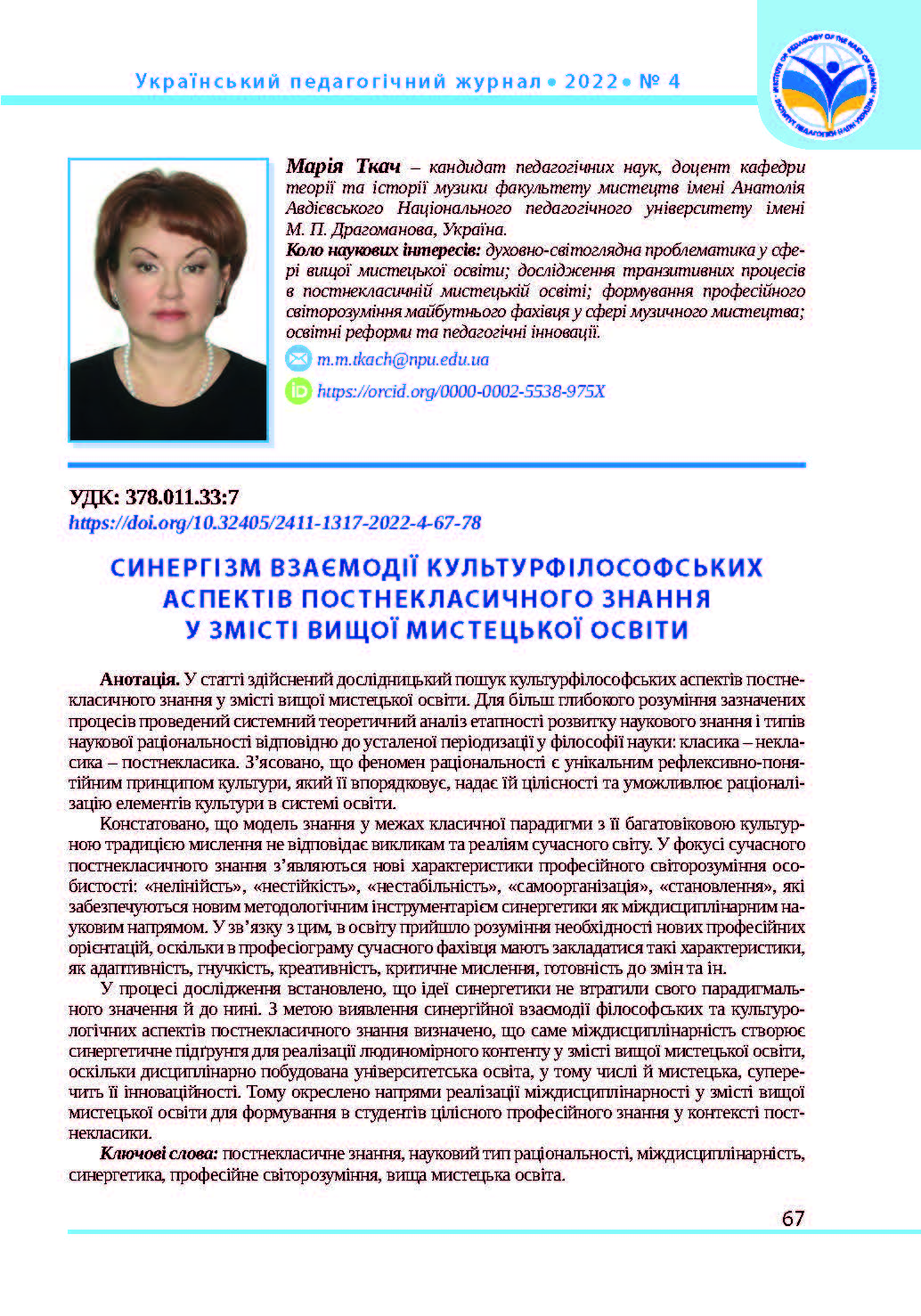Abstract
In the article the research of cultural-philosophical aspects of post-non-classical knowledge in the content of higher art education has been made. For a deeper understanding of the mentioned processes, a systematic theoretical analysis of the stages of the development of scientific knowledge and the types of scientific rationality was carried out in accordance with the established periodization in the philosophy of science: classics – non-classics – post-non-classics. It has been found out that the phenomenon of rationality is a unique reflective and conceptual principle of culture that organizes it, provides its integrity and enables the rationalization of elements of culture in the education system.
It was established that the model of knowledge within the classical paradigm with its centuries-old cultural tradition of thinking does not meet the challenges and realities of the modern world. In the focus of modern post-non-classical knowledge, new characteristics of the professional worldview of an individual appear: "non-linearity", "fragility", "instability", "self-organization", "formation", which are provided by the new methodological toolkit of synergy as an interdisciplinary scientific direction. In this regard, education has come to understand the need for new professional orientations, since such characteristics as adaptability, flexibility, creativity, critical thinking, readiness for changes, etc. should be included in the professional profile of a modern specialist.
In the process of research, it has been determined that the ideas of synergy have not lost their paradigmatic significance even to this day. In order to identify the synergistic interaction of philosophical and cultural aspects of post-non-classical knowledge, it has been established that it is the interdisciplinarity that creates a synergistic basis for the implementation of human-dimensional matter in the content of higher art education, since a disciplinary-constructed university education, including art, contradicts its innovativeness. Therefore, directions for the implementation of interdisciplinarity in the content of higher art education for the formation of students' integral professional knowledge in the context of post-non-classicism have been outlined.
References
Андрущенко, В. П. (2009). Ціннісний дискурс в освіті в епоху глобалізації та інформаційної революції: вибр. публікації представників наук. шк. академіка АПН України, д-ра філ. наук, професора В.П. Андрущенка. НПУ імені М.П. Драгоманова
Аристотель (2002). Нікомахова етика / пер. В. Ставнюка. Київ: Аквілон-Плюс.
Гадамер, Г.- Ґ. (2000). Істина і метод / пер. з нім. О. Мокровольського. Т.1.: Герменевтика I: Основи філософської герменевтики. Київ: Юніверс.
Головко, Б. А. (1999). Онтологія існування людини у Мартіна Гайдеґґера. Феноменологія буття людини : сучасна західноєвропейська філософська рефлексія. Київ : Український центр духовної культури, 161 – 200.
Добронравова, І. С., Білоус Т. М., Комар О. В. (2009). Новітня філософія науки. Підручник. Київ: Логос. http://www.philsci.univ.kiev.ua/biblio/Dobr-bil-kom.htm
Завгородній, Ю. (2002). Ньютон Ісаак. Філософський енциклопедичний словник. Київ: Абрис.
Зязюн, І. А. (2008). Філософія педагогічної дії: монографія. Черкаси: Вид. від ЧНУ імені Богдана Хмельницького.
Кошарний, С. О. (1999). Структури людського буття і методологія їх осмислення в класичній феноменології (Е. Гуссерль). Феноменологія буття людини : сучасна західноєвропейська філософська рефлексія. Київ : Український центр духовної культури, 73 – 160.
Кремень, В. Г. (2013). Сучасний навчальний процес як синергетична система. Освітні реформи: місія, дійсність, рефлексія: монографія. За ред. В. Кременя, Т. Левовицького, В. Огнев’юка та ін. Київ: ТОВ «Видавниче підприємство «ЕДЕЛЬВЕЙС», 21 – 46.
Мамардашвілі, М. К. (2000). Картезіанські роздуми. Київ : Стилос.
Олексюк, О. М. (2019). Розвиток духовного потенціалу особистості у постнекласичній мистецькій освіті : монографія. Київ: Київський університет ім. Бориса Грінченка.
Олексюк, О. М., Ткач, М. М., Лісун, Д. В. (2013). Герменевтичний підхід у вищій мистецькій освіті: колективна монографія. Київ: Київський університет ім. Бориса Грінченка.
Саух, П. Ю. (2019). Від розбалансованості до синергії освітнього процесу: проблеми і перспективи. Горизонт духовності виховання: колективна монографія. Уклали й підготували Йонас Кевішас та Олена М. Отич. Вільнюс : Žuvėdra, 74‒91.
Сидоренко, Л. І. (2011). Аксіологія постнекласичної науки. Сучасна українська філософія: традиції, тенденції, інновації: збірник наукових праць. Київ: Видавничо-поліграфічний центр «Київський університет», 204 – 222.
Ткач, М. М. (2019). Концепт професійного світорозуміння майбутнього вчителя музичного мистецтва у постнекласичному дискурсі. Духовність особистості: методологія, теорія і практика : збірник наукових праць. 4 (91). OI: https://doi.org/10.33216/ 2220-6310-2019-91-4-208-222
Ткач, М. М. (2020). Постнекласичні актуалітети вищої мистецької освіти: онтологічний вимір. Мистецтво та освіта: науково-методичний журнал. 1(95), 14 – 20. DOI: https://doi.org/10.32405/ 2308-8885-2020-91-1-14-20
Шинкарук, В.І та ін (ред). (2002). Філософський енциклопедичний словник. Київ: Абрис.
Ярошовець, В.І. (ред.). (2012) Історія філософії. Словник. 2-ге вид., прероб. Київ: Знання України, 287 – 291.
Mugerauer, B. (2014). Maturana and Varela: From Autopoiesis to Systems Application. Traditions of Systems Theory: Major Figures and Contemporary Developments. 158‒178.
Durkheim, E. (1998). Uber soziale Arbeitsteilung. Frankfurt am Main.
Haken, H. (2004). Synergetics: Introduction and Advanced Topics. Springer.
Husserl, E. (1950). Cartesianische Meditationenund Pariser Vortäge. Husserliana. Bd. 1. Den Haag.
Prigogine, I., Stengers, I. (1984). Order out of Chaos. University of Michigan: Bantam Books.
Prigogine, I., Stengers, I. (1997). The End of Certainty: Time, Chaos and the New Laws of Nature, Free Press.
Rickert, H. (1924). Das Eine, die Einheit und die Eins. Tubingen, 22.
Tkach, M. M., & Oleksiuk, O. M. (2021). Value-based orientations as a normative regulatory mechanism for the formation of professional worldview of future music teachers. Linguistics and Culture Review, 5(S2), 522‒536. https://doi.org/10.37028/lingcure.v5nS2.1388
Tkach, M., Oleksiuk, O., Kosinska, N. & Kyfenko, A. (2022). Posnonclassical Practices in the Content of Higher Art Education. Journal of Higher Education Theory and Practice. 22 (6), 206 – 214.

This work is licensed under a Creative Commons Attribution-NonCommercial-ShareAlike 4.0 International License.
Copyright (c) 2023 Марія Ткач

